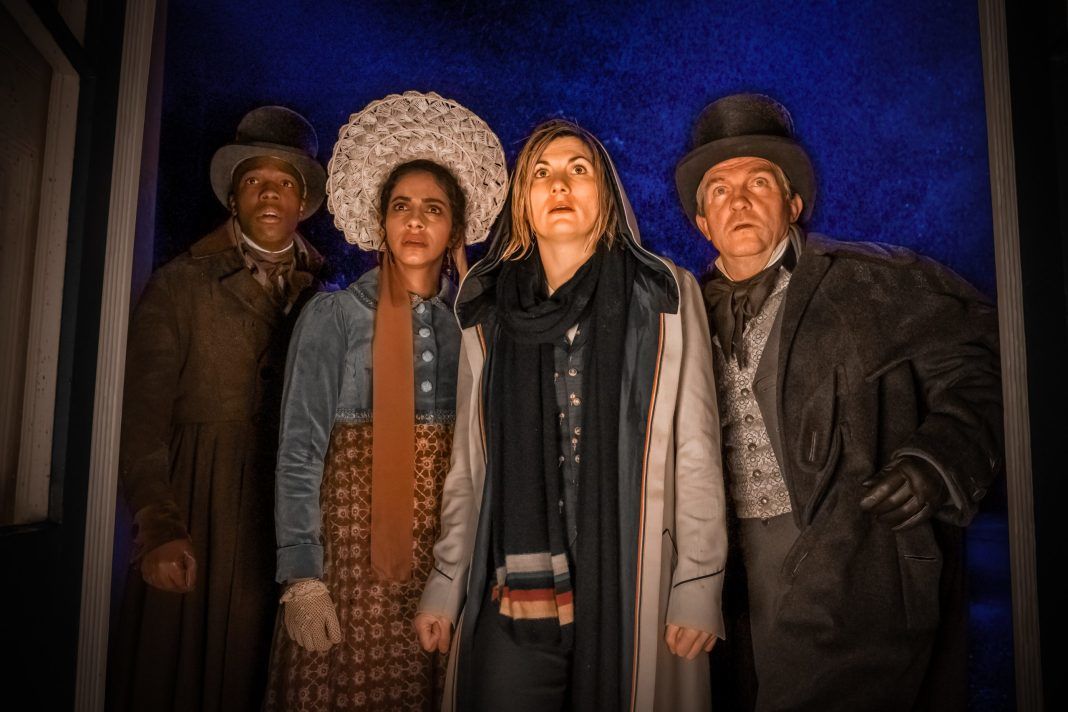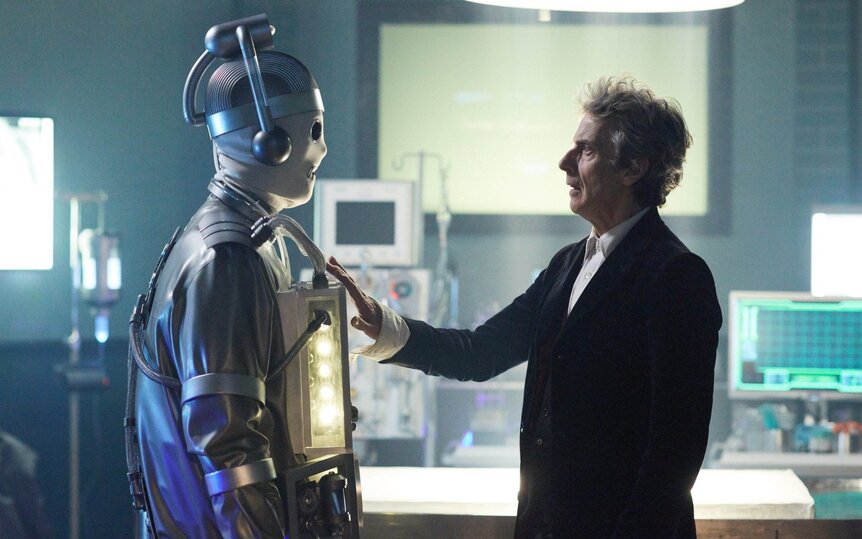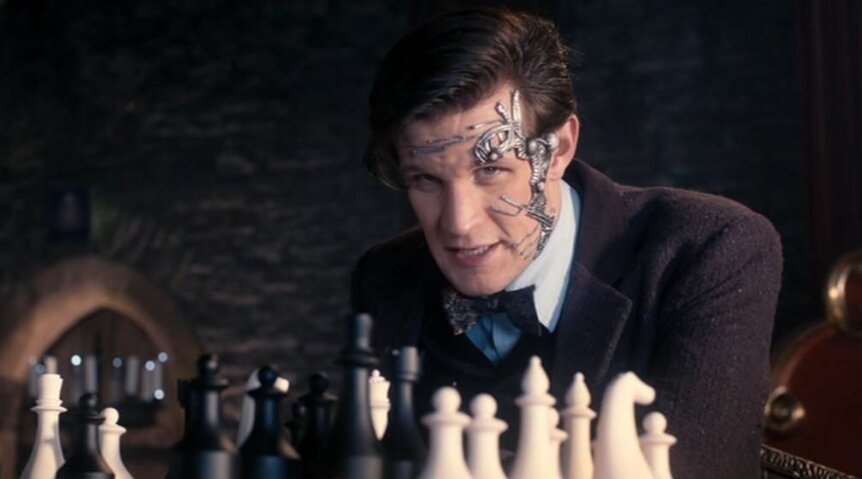Create a free profile to get unlimited access to exclusive videos, sweepstakes, and more!
Doctor Who changes science fiction history (again)

Pinpointing the exact origin of western science fiction narratives is a little tricky, but you'll find many literary cheerleaders who claim this whole idea of mixing far-out science ideas with truly out there stories starts when Mary Shelley reanimates a composite corpse in her immortal novel 1818 novel, Frankenstein. In the latest Doctor Who time-travel jaunt, our eponymous Time Lord not only meets the progenitor of all the science fiction genre as we know it but also seemingly reanimates the chronology of the villainous space-Frankensteins: the Cybermen.
In "The Haunting of Villa Diodati," Doctor Who has set up some big stakes for the upcoming two-part season finale but has also heavily referenced its own continuity, while suggesting a time-travel-ish cyborg origin for the genre of science fiction itself.
**Spoiler Warning: There are spoilers ahead for Doctor Who, Season 12, Episode 8, "The Haunting of Villa Diodati."**
"Nobody Mention Frankenstein!"
The basic setup of the episode revolves around the Doctor and Team TARDIS encountering a famous author/artist on the verge of creating something famous. In this case, they land on a rainy day in 1816 in which Mary Shelley, Percy Shelley, Lord Byron, and John William Polidori tried to out-scare each other by each writing scary stories. In real life, this crazy brainstorm produced two mega-famous books: Mary Shelley's Frankenstein and Polidori'sThe Vampyre; in terms of horror fiction history, this was a pretty big day.
This episode is mostly all about the Frankenstein homages, but it should be noted that Polidori's The Vampyre pre-dates Bram Stoker's Dracula by nearly 80 years. So, again, if you like horror and sci-fi, this is probably the most important historical event Doctor Who has ever visited.
And yet, this kind of thing is old hat for Doctor Who; the 4th Doctor enlisted the help of Leonardo da Vinci in "The City of Death," the 9th Doctor met Charles Dickens in "The Unquiet Dead," the 10th Doctor met Agatha Christie in "The Unicorn and the Wasp," and the 11th Doctor met Vincent van Gogh in "Vincent and the Doctor." And just as "The Unicorn and the Wasp" suggests that Agatha Christie gained inspiration to create Miss Marple from the future, "The Haunting of Villa Diodati" basically outright says that Mary Shelley was inspired by this encounter with the Cybermen to write Frankenstein.
Here's how: Shelley notices that the Lone Cyberman is a "composite of parts," and even refers to him as a "modern Prometheus," which is the alternate title for Frankenstein. And, in a move almost identical to the Creature from Shelley's novel, this cyber-monster spares the life of a child when it could easily have not.
Team TARDIS member Ryan Sinclair even encourages Mary Shelley to keep writing, which seems to firmly establish that yes, Doctor Who is implying that its own canon has now subsumed the creation of Frankenstein itself. This paradox is a little like Marty McFly introducing the name "Darth Vader" into the lexicon in 1955 in the original Back to the Future. Either you want to never think about the paradox again, or all you can do is think about it non-stop.
Perception Filter
Speaking of what you can and can't think about, one of the most important plot pivots of the episode is connected the fact that famous poet Percy Shelley — imbued with powers from the Cybermen — is using a perception filter to make everyone believe they are trapped in certain rooms of the house and can't get out. The perception filter is the same technology that prevents most people from noticing the TARDIS when it lands somewhere it might not fight in.
In the 10th Doctor episode "The Sound of Drums," Martha Jones, the Doctor, and Captain Jack Harkness use pieces of the TARDIS key to make bespoke perception filters that they can wear around their necks. And in the 11th Doctor episode "The Eleventh Hour," the entire reason Amy Pond doesn't remember certain rooms in her own house is directly connected to a perception filter.
The Doctor's Personal Beef with the Cybermen
At both the top and bottom of the episode, the Doctor is crazy-angry at even the notion of the Cybermen, and at one point says defiantly, "I will not lose anyone else to that!" This is a direct reference to the final Peter Capaldi 12th Doctor episodes, specifically "The Doctor Falls," in which Bill Potts becomes, basically, one of the first Cybermen. The 12th Doctor also saw Danny Pink become a Cyberman in "Death in Heaven." And later, the 12th Doctor was actually shot by a Cyberman in "The Doctor Falls," before eventually regenerating into the 13 Doctor in "Twice Upon a Time."
It's also probably important to note that the Cybermen are indirectly responsible for the death of the 5th Doctor's young companion Adric in the episode "Earthshock," which was one of the only times the series has actually killed off a companion in such a way in which there was no chance for them to come back.
Finally, Cybermen from an alternate universe are also basically the reason Rose Tyler was trapped in that alternate dimension in the fan-favorite tear-jerker episode "Doomsday." So yeah, the Doctor freaking hates the Cybermen.
The Cyber-Wars; What Are They Good For?
The episode ends with the Doctor talking about the Cyber-Wars of the future. This is a murky concept and has been mentioned in Doctor Who canon a lot, but was pinpointed in the 4th Doctor episode "The Revenge of the Cybermen." Sometimes these wars take place in the 23rd century, but in that same 5th Doctor episode, "Earthshock," the Doctor suggests the Cybermen lost a major war in the 26th century too. In the 11th Doctor episode "A Good Man Goes to War," the Cybermen were still around in the 52nd century, though it's not clear if they were at war with humans at that point.
The last time we saw a far-future version of the Cyber-Wars was in the 11th Doctor Neil Gaiman-penned episode "Nightmare in Silver," where, in a distant future, the Cybermen tried to turn the Doctor into a new Cyber-Planner, which echoes exactly what almost just happened to the 13 Doctor in "The Haunting of Villa Diodati."
By the end of the episode, the Doctor makes it pretty clear that the Cybermen are trying to rewrite history, which, for them, is not a new trick. The Cybermen tried to attack Victorian England in the 10th Doctor episode "The Next Doctor," so time-travel war is kind of the main jam of the Cybermen. But does that mean the Cyber-Wars of this far future will be different from the ones referenced in canon before? And what does Captain Jack know about all of this?
Those answers will, hopefully, be answered in the next two episodes of Doctor Who Season 12. But if Whovians have learned anything by now, we should know that time can be rewritten. Especially when you throw the word "cyber" in there.
Doctor Who Season 12 has two episodes left, which will air over the next two Sundays on BBC America.

















